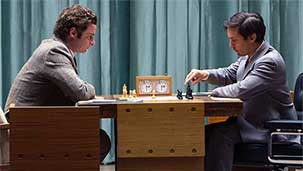Tricking out a beautiful car out with chrome—its silhouette distorted by superfluous crap—is a sin. Venal perhaps, but still a sin. Pawn Sacrifice, a perfectly good film, is at least partially undermined by distracting technical flourishes—the movie equivalent of pimping out a BMW M4.
Sometimes beauty, truth and clarity lie in a clean spare line, not a bunch of rococo embellishments. This story—a compelling moment in history when a problematic American wunderkind held the world’s attention as he engaged in a mythic battle with the Russian chess grandmaster—doesn’t need any garnish. Unfortunately your director, Edward Zwick, (Glory, _Last Samurai) is not known for his restraint. Zwick is someone who has never met a dramatic moment he didn’t yearn to heighten with some kind of visual hyperbole.
Art house close ups of a bloodshot eye pulling out to a destroyed hotel room are the kind of nonsense that is simply not required. You could have someone narrate this script in front of a blackboard, pausing occasionally to chalk out a complex chess problem, and it would still be compelling. I was ten years old when this match took place—and only marginally familiar with chess—yet I still remember how this competition held the world’s attention.
In 1972 Russia was still a monstrous shibboleth for most of the West. So the idea of a self-taught Grandmaster from Brooklyn laying waste to the otherwise invincible chess royalty of the Soviet Union made for the kind of copy newspapers and television could only dream of. Everyone started playing chess or at least became involved enough that they could tell you what a rook was and how it moved on the board. It was one of many surrogate wars that the USSR and the West would engage in before the bubble finally popped in the late eighties with the advent of Perestroika and the fall of the Berlin Wall. It was also perfectly cast: the quirky American, Fischer, acerbic and rumpled (and probably already in the throes of some kind of serious psychopathy) versus the robotically cool example of White Russian perfection, Boris Spassky.
Pawn Sacrifice works best when it maintains a distance and reads most like a documentary with superb access. This is where I feel you had the most input. The scenes where the camera is quiet and unobtrusive; when there are no animated chess formula leaking from Fischer’s head like ghosts from The Computer Who Wore Tennis Shoes. Scenes like a bar full of people watching closed circuit feeds of two men hunched over a chessboard, the only noise an occasional click of a clock being stopped. This is when the film captures the moment, when it feels like something true.
As far as performances go Liev Schreiber is close to perfect as Spassky. Schreiber’s Russian is superb and adds a tremendous credibility to a restrained performance. Tobey Maguire as Bobby Fischer already looks like he’s on the edge of a nervous breakdown, so he didn’t have far to go. Still, he was perfectly serviceable. The most surprising performance was Peter Sarsgaard as one of Fischer’s handler/minders. For the small amount of screen time he had to work with, Sarsgaard made an outsized impact and was a necessary balance point to Maguire’s manic presence.
The scenes in Reykjavík, where the competition takes place, forces a kind of minimalist visual sensibility—simply by dint of the actual landscapes (both the exteriors and the interior sets)—so it is here that the film leans most heavily on just telling the story. Not co-incidentally it is the strongest part of the film. The third act is tremendous and salvages the film from mediocrity.
Your work on Selma and particularly _A Most Violent Year clearly demonstrate your capacity for an understated aesthetic that privileges coherence over stylistic embellishments. I simply wish that you had managed to leverage a little more of that into this film. There were teasing glimpses of what this film could have been in quieter hands and I wish I had seen more of that and less of the intrusive, showy Zwickisms.
Sincerely,

Tim







